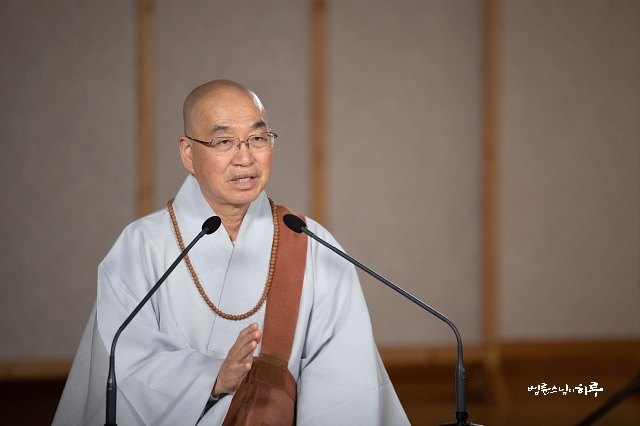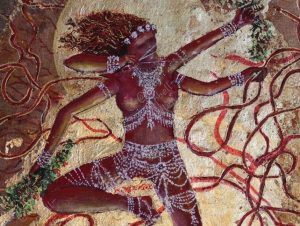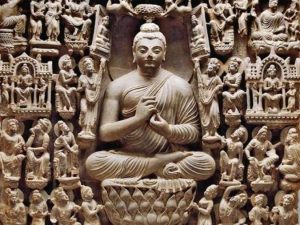
The Korean Seon (Zen) master Venerable Pomnyun Sunim (법륜스님) wears many hats: Buddhist monk, teacher, author, environmentalist, social activist, and podcaster, to name a few. As a widely respected Dharma teacher and a tireless socially engaged activist in his native South Korea, Ven. Pomnyun Sunim has founded numerous Dharma-based organizations, initiatives, and projects that are active across the world. Among them, Jungto Society, a volunteer-based community founded on the Buddhist teachings and expressing equality, simple living, and sustainability, is dedicated to addressing modern social issues that lead to suffering, including environmental degradation, poverty, and conflict.
The following article is part of a series of essays shared by Jungto Society of notable highlights from Ven. Pomnyun Sunim’s writings, teachings, and regular live-streamed Dharma Q+A sessions, which are accessible across the globe.
Everybody wants to be free and happy but they are not. This is not because it is impossible to be free and happy, but because they are going in the wrong direction. As they are going in the wrong direction, they can’t reach their destination no matter how steadfastly they walk.
Why am I saying that people are going in the wrong direction? People in the world consider the good feelings they have when things go their way to be happiness. They consider the bad feeling they have when things don’t go their way to be unhappiness. And they think that doing whatever they want is freedom and not doing what they want is bondage. These are ordinary people’s concepts of happiness and freedom. However, in real life, these values can’t be realized.
When your desires are fulfilled, you feel joy briefly. But when your desires are not fulfilled, you suffer. As there is no end to desire, you experience joy and suffering repeatedly. The Buddha said that this never-ending cycle of joy and suffering is the inevitable contradiction and limit of human life. Joy and suffering can’t be divided. Yesterday’s suffering can turn into today’s joy and today’s joy can turn into tomorrow’s suffering. Since people don’t know this principle, they want to live in a world that is filled with joy and devoid of suffering, thinking that it is possible to live in such a world. However, this is not possible in real life, and so they wish to be born in such a world after they die. Therefore, every religion has an ideal world called heaven or paradise.
The level of consumption in modern society is even higher than that which is supposedly provided by the ideal world—the heaven that people dreamed of in the past. But we have greater desires now, so we often consider our life conditions to be no better than hell. We can’t see this contradiction because we only see what we want to achieve. Thinking that they are unhappy because their abilities or efforts are not sufficient, people try to get what they want by asking a powerful third party. As a result, religions that contain elements of asking for help from almighty gods came to exist.
Religions already existed 5,000 years ago. The contemporaries of the Buddha, who lived 2,600 years ago, also tried to solve the contradictions of the world with religion. Religious teachings can comfort people temporarily, like drugs, but they can’t solve these problems fundamentally.
The way of neither following nor suppressing desires
The Buddha investigated how to solve this problem in-depth. He discovered that the root cause of this never-ending cycle of joy and suffering is desire. When your desires are fulfilled, you feel joy. When your desires are not fulfilled, you suffer. But once you are free from desire, joy and suffering also disappear. The cycle of joy and suffering ends. But people can’t even imagine being free from desire. People can think of only two ways to respond to desire: surrendering or resisting. In the West, these two ways were expressed as Epicureanism and Stoicism. And in India, they were expressed as hedonism and asceticism. The Buddha experienced ultimate pleasure and ultimate self-mortification, and found that neither are the right way toward liberation and nirvana. He discovered a third path, the Middle Way. He followed the Middle Way and attained liberation and nirvana.
The Middle Way is just recognizing desire, instead of following or suppressing. When you follow desire, consequences follow, and when you suppress desire, you become stressed. People suppress desire because following it will result in loss, but suppressing it leads to frustration and eventually to an explosion. Explosions result in loss again, so they suppress it, and then explode again. This cycle is repeated constantly. However, simply recognizing desire is not to respond to it at all; neither following nor suppressing.
True freedom is to be free from desire by recognizing it. Then, from where does desire arise? The root of desire is karma. When your karma comes into contact with an external situation, a feeling arises, and based on that feeling a desire arises. Each person has different karma, so each person has different desires.
Some people have a strong desire for money, whereas others have no desire for money. Some people have a strong desire for food, whereas others don’t care much about food and they can eat anything offered, like an ascetic. Different people have different desires. This gives us hope because although it seems impossible for humans to be free from desire, even ordinary people are free from some desires. Therefore, we can see that becoming free from desires is not impossible and anyone can do it.
We seem to live our life, but in fact our life is the automatic reactions of our karma. Based on each reaction, a desire arises within us and then we act on the desire. In other words, our life is a perpetual repetition of karma and desire. People think that they are unhappy because of some external circumstances, but this is only a secondary and partial reason. When we are free from desire, we seldom suffer or feel fettered.
Observing the precepts is essential to becoming free from desire and karma
Then how can we be free from our desires and karma? We meditate to achieve this freedom. However, wanting to be free from desire while eating whatever you want to eat, lying down when you want to lie down, and doing whatever you want to do is contradictory. In addition, to our desires for food and sleep, we have other serious karma. Even if we are free from our desires for food and sleep, attaining liberation will be difficult. As such, wishing for liberation without even achieving this much is contradictory.
For example, let’s say I have a habit of smoking. I am not saying that smoking is bad but being unable to quit smoking while pursuing liberation and nirvana is contradictory. How can I be free from karma that has been formed through infinity if I can’t even quit smoking—a habit that is only several years or decades old? That is why anyone who wishes to move toward liberation and nirvana needs to observe the precepts. We need to value and observe the precepts. Practicing to attain liberation and nirvana while not observing the precepts is contradictory.
A slave is forced to do something and a master takes the lead
Therefore, I recommend that you voluntarily follow the rules to control desires, instead of worrying about what others might think of you if you don’t follow them. If you observe the precepts voluntarily, they are not restraints. Jesus said: “If anyone forces you to go one mile, go with them two miles,” “If someone takes your coat, do not withhold your shirt from them,” and “If someone slaps you on one cheek, turn to them the other also.” Have a willing mind like this. If you are forced to do something, you are a slave but if you take the lead, you are a master.
Even if there are no restrictions on food, I recommend that you decide: “I will eat a little because I won’t need much energy while meditating,” and even if there is no restriction on lying down, I recommend that you decide: “I will lie down only during the designated hours while I am participating in the practice to be free from desire.” If you decide like this, voluntarily, you won’t feel restricted.
See more
Pomnyun
Jungto Society
JTS Korea
JTS America
International Network of Engaged Buddhists
Related videos from BDG
Dharma Q+A with Ven. Pomnyun Sunim
Wisdom Notes from Ven. Pomnyun Sunim
Related features from BDG
Ven. Pomnyun Sunim: Buddhism in a Divided World
The Hungry Should Eat: JTS Brings Buddhist Compassion and Relief to India
Engaged Buddhism: Seon Master Pomnyun Sunim Pledges 10,000 Tons of Food Aid for Children in North Korea
Engaging with Suffering, Realizing Freedom: An Interview with Ven. Pomnyun Sunim
Related news reports from BDG
Engaged Buddhism: Ven. Pomnyun Sunim Shares the Fruits of Compassion to Mark the Birth of the Buddha
Engaged Buddhism: Ven. Pomnyun Sunim Delivers Compassion to the Vulnerable in Korea
Engaged Buddhism: Jungto Society Delivers Compassion for the Vulnerable in Korea
Engaged Buddhism: JTS Korea Distributes Emergency Flood Relief in Cambodia
Engaged Buddhism: JTS Korea Donates COVID-19 Relief Supplies to Myanmar in Cooperation with INEB and KMF
Engaged Buddhism: Jungto Society Sharing the Gift of Compassion this Winter
UPDATE: Buddhist Relief from JTS Korea Transforming the Lives of Rohingya Refugees
Engaged Buddhism: JTS Korea Brings Warmth to Vulnerable Communities amid Winter Freeze















